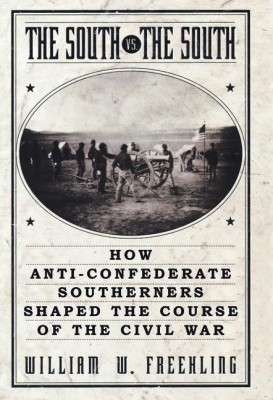| The South vs. The South: How Anti-Confederate Southerners Shaped the Course of the Civil War Contributor(s): Freehling, William W. (Author) |
|
 |
ISBN: 0195156293 ISBN-13: 9780195156294 Publisher: Oxford University Press, USA OUR PRICE: $19.79 Product Type: Paperback Published: November 2002 Annotation: Why did the Confederacy lose the Civil War? Most historians point to the larger number of Union troops, or to the North's greater industrial might. Now, in The South Vs. the South, a leading authority on the Civil War era offers a critical supplementary viewpoint. William Freehling argues that 450,000 Union troops from the South--especially border state whites and southern blacks--helped cost the Confederacy the war. In addition, when the southern border states rejected the Confederacy, half the South's industrial capacity swelled the North's advantage. Whether revising our conception of Union military strategy or of slavery, or changing our perceptions of blacks' role in producing Lincoln's Emancipation Proclamation, or finding new meanings in what is arguably America's greatest piece of sculpture, Augustus Saint-Gaudens' Shaw Memorial, or establishing the antecedents to Martin Luther King, Jr., Freehling's piercing insight and rhetorical verve yield a major new Civil War narrative. |
| Additional Information |
| BISAC Categories: - History | United States - Civil War Period (1850-1877) - History | Military - United States - Social Science | Minority Studies |
| Dewey: 973.7 |
| LCCN: 00051678 |
| Physical Information: 0.51" H x 6.52" W x 8.58" (0.45 lbs) 256 pages |
| Themes: - Chronological Period - 1851-1899 - Cultural Region - South - Ethnic Orientation - African American - Topical - Civil War |
| Descriptions, Reviews, Etc. |
| Publisher Description: Why did the Confederacy lose the Civil War? Most historians point to the larger number of Union troops, for example, or the North's greater industrial might. Now, in The South Vs. the South, one of America's leading authorities on the Civil War era offers an entirely new answer to this question. William Freehling argues that anti-Confederate Southerners--specifically, border state whites and southern blacks--helped cost the Confederacy the war. White men in such border states as Missouri, Kentucky, and Maryland, Freehling points out, were divided in their loyalties--but far more joined the Union army (or simply stayed home) than marched off in Confederate gray. If they had enlisted as rebel troops in the same proportion as white men did farther south, their numbers would have offset all the Confederate casualties during four years of war. In addition, when those states stayed loyal, the vast majority of the South's urban population and industrial capacity remained in Union hands. And many forget, Freehling writes, that the slaves' own decisions led to a series of white decisions (culminating in the Emancipation Proclamation) that turned federal forces into an army of liberation, depriving the South of labor and adding essential troops to the blue ranks. Whether revising our conception of slavery or of Abraham Lincoln, or establishing the antecedents of Martin Luther King, or analyzing Union military strategy, or uncovering new meanings in what is arguably America's greatest piece of sculpture, Augustus St.-Gaudens' Shaw Memorial, Freehling writes with piercing insight and rhetorical verve. Concise and provocative, The South Vs. the South will forever change the way we view the Civil War. |